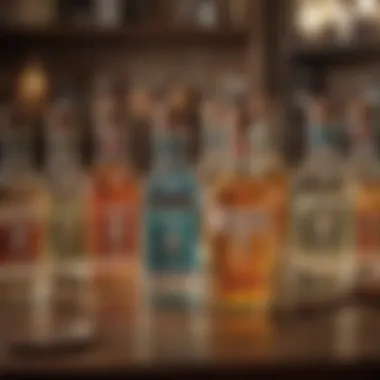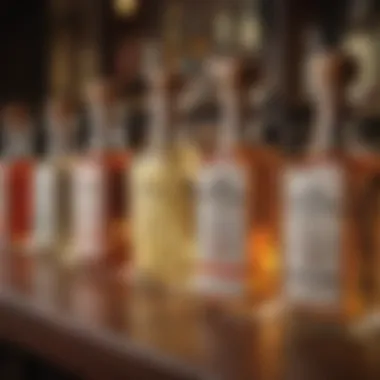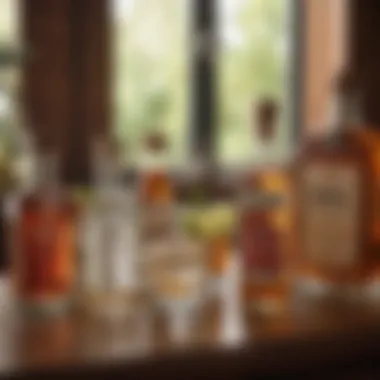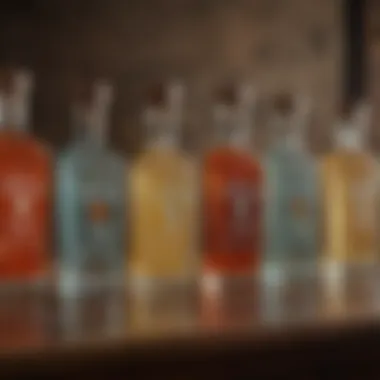Ultimate Guide to 1800 Tequila Mixers for Cocktails


Intro
Tequila, particularly 1800 Tequila, holds a significant place in the world of spirits. With its rich history and diverse flavors, it has gained popularity among enthusiasts and casual drinkers alike. This guide explores the various mixers that can elevate 1800 Tequila experiences.
Choosing the right mixer is not merely a matter of preference; it enhances the overall cocktail, complementing the distinct flavor profile of the tequila. Understanding which ingredients work harmoniously with different styles of 1800 Tequila can lead to a more refined drinking experience.
Whether one prefers a classic margarita or a contemporary cocktail, this guide covers essential insights, helping readers navigate their choices with confidence.
Prelude to Tequila
Understanding 1800 Tequila is essential for anyone interested in tequila mixers. This section provides a foundation for appreciating the depth and variety of tequila, particularly the 1800 brand. Given its rich heritage and distinct production methods, 1800 Tequila stands as a significant player in the spirits market. Exploring its origins, types, and characteristics can help enthusiasts and casual drinkers alike choose the right mixers to enhance their cocktail experience. Knowing these details not only enriches the drinking experience but also elevates the art of mixology.
The Origin and Production of Tequila
1800 Tequila has a prominent place in the history of tequila production. It is produced in Jalisco, Mexico, where the blue agave plant flourishes. The distillation process begins with harvesting the heart of the agave, known as the piña. Once harvested, the piña undergoes a thorough cooking process in traditional stone ovens, extracting the natural sugars needed for fermentation.
The fermentation occurs naturally, utilizing the wild yeasts present in the environment, which adds a unique flavor profile to the tequila. After fermentation, the liquid is distilled in copper pot stills. The resulting spirit is aged in American and French oak barrels, providing different flavor notes and enhancing its complexity. This meticulous process is crucial, as it ensures that every bottle of 1800 Tequila reflects quality and tradition.
Types of Tequila
1800 Tequila comes in three distinct varieties: 1800 Silver, 1800 Resposado, and 1800 Anejo. Each type offers different flavor spectrums and aging characteristics, making them suitable for a variety of mixers and cocktails.
Silver
1800 Silver is known for its bright, crisp flavor, and is often enjoyed straight or in cocktails. This blanco tequila is not aged and showcases the pure essence of agave. The sharp, clean taste of 1800 Silver makes it a popular choice for mixologists looking to create refreshing cocktails.
The key characteristic of this tequila lies in its raw agave flavor. As a blanco, it retains the vibrant notes of the agave plant, which contribute to its versatility. The absence of aging allows for a more pronounced flavor, making it ideal for cocktails like margaritas and mixed drinks where clarity of taste is essential.
However, its purity can be a disadvantage in some recipes that require a smoother, more complex profile. Nonetheless, it remains an essential element for tequila enthusiasts.
Resposado
1800 Resposado is aged for six months in oak barrels. This aging process introduces a richness that complements its agave flavor. The result is a smoother tequila with hints of vanilla and caramel, making it an excellent mixer for rich cocktails. Its balance of sweetness and complexity makes 1800 Resposado a favorite for various drinks.
The prominent oak influence is what differentiates it from the Silver variant. As a result, it pairs well with mixers like fruit juices and flavored syrups. However, it's essential to choose your mixers wisely to ensure they complement the tequila rather than overpower it. It’s a choice for those who prefer a more rounded flavor in their cocktails.
Anejo
1800 Anejo takes aging a step further, spending at least one year in oak barrels. This aging process gives it a deep amber color and a complex flavor profile that includes notes of spice, oak, and chocolate. This tequila is best enjoyed neat but also works well in sophisticated cocktails.
The unique feature of 1800 Anejo is its depth and richness, offering intertwined layers of flavor that engage the palate. Its robust nature makes it less suited for traditional mixers that might dilute its profile. Instead, consider using it in cocktails that highlight its qualities, such as an Old Fashioned with a twist.
Choosing the right type of 1800 tequila is crucial as it directly influences the overall flavor and quality of your cocktails. Understanding these distinctions is the first step to mastering 1800 tequila mixers.
Understanding Mixers
The role of mixers in the creation of cocktails cannot be underestimated. They serve not only to enhance the taste of spirits but also to balance and create complex flavor profiles. In the context of 1800 tequila, selecting the correct mixer can elevate the drinking experience. This section aims to explain why understanding mixers is essential when working with 1800 tequila.
Mixers can drastically influence the final beverage. They can enhance the natural flavors of tequila or introduce entirely new dimensions that can change how the drink is perceived. Here are some key points regarding the importance of mixers:
- Flavor Enhancement: The right mixer can highlight the agave notes of 1800 tequila.
- Texture and Mouthfeel: Mixers contribute to the body of the cocktail, whether you prefer a light and refreshing drink or a richer texture.
- Cultural Influence: Many mixers carry cultural significance, providing a connection to Mexican traditions and heritage.


Moreover, understanding mixers involves knowing their compatibility with different styles of tequila like 1800 Silver, Reposado, and Anejo. Each type has unique characteristics that can be complemented or overwhelmed by various mixers. Knowing these relationships allows for the precision needed to craft exquisite cocktails that resonate with different palates.
What Are Cocktail Mixers?
Cocktail mixers are ingredients added to beverages to enhance or modify the overall flavor. In essence, they dilute the spirit while contributing to a harmonious balance in taste and texture. Common types of mixers include:
- Juices: Citrus juices like lime and orange are popular for their ability to cut through the richness of spirits.
- Sodas: Soft drinks help to add fizz and sweetness, making them ideal for mixed drinks.
- Syrups: Flavored syrups can introduce new flavors and sweetness, allowing for creative exploration.
In the realm of 1800 tequila, mixers are essential for achieving the desired taste and presentation. They make the drink more enjoyable and accessible to a broader audience.
Impact of Mixers on Flavor Profiles
Mixers can significantly impact the flavor profiles of tequila cocktails. The interaction between the tequila and the mixer can be complex, creating layers of flavors that enhance the overall experience.
When combining mixers with 1800 tequila, consider the following points:
- Complementary Flavors: Some mixers work well due to their ability to enhance the tequila's inherent flavors. For instance, lime juice can add brightness that complements the agave.
- Contrast: Other mixers may introduce contrasting flavors that can create a unique cocktail. An example is adding soda for a refreshing fizz against the smoothness of a high-quality tequila.
- Balancing Sweetness and Acidity: The right mix of sweet and sour can dictate the appeal of a cocktail. Mixers need to be measured to ensure they do not dominate the essence of the tequila.
"The true art of mixing lies in finding that perfect balance where the tequila's spirit shines through, while the mixer enhances it in subtle ways."
Focusing on the relationship between 1800 tequila and its mixers can spark creativity. It paves the way for experimentation, enabling drinkers to explore a dimension of taste that goes beyond the ordinary.
Popular Mixers for Tequila
Mixers serve a fundamental role in tequila cocktails, particularly when using 1800 Tequila. The right mixer can enhance the flavors, balance the spirit, and create a more enjoyable experience. The choices of mixers are varied, and understanding their characteristics can help in making informed decisions. Furthermore, certain mixers complement specific types of 1800 Tequila, such as Silver, Resposado, or Anejo. This serves to elevate the overall cocktail experience. As such, knowing the popular mixers allows for greater creativity in mixology.
Citrus Juices
Lime Juice
Lime juice is a staple for many tequila cocktails. Its bright, acidic flavor creates a refreshing contrast to the earthy notes of 1800 Tequila. Lime juice is especially favored in classic recipes, such as the Margarita.
Key characteristic: The tartness of lime juice cuts through the richness of tequila. This makes it a beneficial component. One unique feature is that fresh lime juice balances the sweetness found in other mixers. An advantage of using lime juice is its ability to enhance the overall tast of the cocktail without overpowering other flavors.
Orange Juice
Orange juice brings a sweet and slightly tart flavor to cocktails. It works exceptionally well with 1800 Tequila, where it highlights the agave notes. Its usability extends to several cocktails, providing versatility in drinks like the Tequila Sunrise.
Key characteristic: The natural sweetness of orange juice complements the tequila. This is why it is a popular choice. A unique feature of orange juice is that it can add a vibrant color to cocktails, making them visually appealing. However, its sweetness can sometimes dominate, so it requires careful balancing with other ingredients.
Grapefruit Juice
Grapefruit juice offers a slightly bitter and tart profile. This can add complexity to cocktails. It is especially useful in the Paloma, where it pairs well with the crispness of tequila.
Key characteristic: The unique bitterness of grapefruit juice contrasts with the sweetness of other mixers. This quality makes it a fascinating option. Grapefruit juice can enhance the tequila's flavors, providing a unique advantage. Nevertheless, its strong taste can be polarizing for some drinkers, which is a consideration when selecting it as a mixer.
Sodas and Soft Drinks
Club Soda
Club soda is a classic mixer in cocktails, known for its refreshing qualities. It helps in maintaining the integrity of the 1800 Tequila without overshadowing its flavors. It is popular for simple cocktails.


Key characteristic: Its carbonated nature adds a fizzy texture. This makes it a popular choice for those who prefer lighter drinks. A unique feature of club soda is its neutral flavor, allowing the tequila to shine through. However, some might find it a tad too plain when seeking a more flavorful cocktail experience.
Sprite
Sprite adds sweetness and citrus flavor to tequila drinks. It is particularly popular for quick, casual cocktails, making it a favored choice for wider gatherings.
Key characteristic: The lemon-lime flavor profile creates a refreshing taste. This feature makes it appealing to a broad audience. The disadvantage is that the sweetness can overpower the more subtle flavors of high-quality tequilas.
Cola
Cola is a bold addition to tequila cocktails. The sweetness and caramel notes can create a unique flavor experience. It is commonly paired in cocktails that aim for a richer profile.
Key characteristic: Cola enhances the overall depth of a cocktail. This can make it a popular choice for those looking for stronger flavors. However, it can mask the more refined notes of the tequila, which may not be ideal for connoisseurs of quality spirits.
Flavored Syrups
Agave Syrup
Agave syrup is derived from the same plant that produces tequila. This creates a natural connection, enhancing the flavors of 1800 Tequila. It is a common sweetening agent in many tequila cocktails.
Key characteristic: Its mild sweetness can add complexity without overwhelming the drink. This is why it is beneficial for those looking to keep cocktails balanced. However, its syrupy texture can sometimes be too thick for lighter drinks.
Grenadine
Grenadine is known for its sweet and fruity flavor. It brings a unique cherry-like taste to tequila cocktails. It is particularly useful in drinks that require a touch of sweetness.
Key characteristic: The vibrant color adds visual appeal to cocktails. This feature makes grenadine a favorite for festive occasions. A disadvantage is that its strong sweetness might not be suitable for all palates, so moderation is key when using it.
Simple Syrup
Simple syrup is a versatile sweetening agent made from sugar and water. It is easy to make and can blend seamlessly into cocktails. This is a key feature that allows mixologists to control sweetness efficiently.
Key characteristic: The ability to adjust sweetness makes it a popular choice. It can enhance the overall depth of flavors in the cocktail. However, without proper balance, cocktails can easily become overly sweet, which is an important consideration.
Crafting the Perfect Tequila Cocktail
In the pursuit of excellence in cocktail creation, crafting the perfect 1800 tequila cocktail holds profound significance. The blend of quality tequila with well-chosen mixers can transform a simple drink into a riveting experience. Here, several specific elements come into play—balance, flavor pairing, and presentation.
Understanding these aspects enables the mixologist to enhance not only the taste but also the aesthetics of their concoctions.
Selecting the right mixer and technique can accentuate the tequila's inherent flavors. Knowledge of the base spirit, in this case, 1800 Tequila, combined with innovative mixing strategies creates cocktails that resonate with depth and character. Therefore, this section underlines the artistry involved in developing memorable tequila cocktails that appeal to seasoned enthusiasts and casual drinkers alike.
Basic Cocktail Recipes
Classic Margarita
The Classic Margarita stands as a pillar of tequila cocktails. Its simple yet vibrant composition makes it a staple in bars and homes alike. A typical Classic Margarita consists of 1800 Silver tequila, lime juice, and orange liqueur, usually triple sec or Cointreau.
One of the key characteristics of this drink is its balance of citrus and sweetness. This balance perfectly complements the robust flavors of the tequila. Additionally, the Classic Margarita is often served with a salted rim, enhancing the tasting experience.
The drink’s relatively low alcohol content makes it an accessible choice for many. This characteristic works in favor of the cocktail as it invites experimentation with additional flavors, making it an ideal candidate for creative mixology.


Tequila Sunrise
The Tequila Sunrise offers a visually striking presentation that mimics a stunning sunrise. Comprising 1800 Tequila, orange juice, and grenadine, this cocktail showcases the vibrant color gradient that captivates the eye.
The key characteristic here is the layering effect created by the grenadine, which is poured last to create a natural gradient. This cocktail is popular due to its refreshing flavor profile and the simplicity of its ingredients. Although its taste may seem straightforward, the visuals elevate its status as a party favorite.
However, it is essential to note that the sweetness from the grenadine may overshadow the tequila flavor for some. Balancing the sweetness with additional citrus can enhance the overall experience.
Paloma
The Paloma is often regarded as one of the best tequila cocktails, especially in Mexico. Typically made with 1800 Reposado tequila, grapefruit soda, and lime juice, this drink features a refreshing blend of flavors.
The key characteristic of the Paloma is its tartness, which enhances the tequila's smoothness. The use of grapefruit soda not only adds flavor but also interesting carbonation. This creates a lively texture in the drink.
Many consider the Paloma a healthier option compared to sweeter cocktails, making it increasingly popular among health-conscious drinkers. Its versatility means that it can be adjusted to suit personal preferences, whether one prefers a more citrus-forward or sweeter approach.
Innovative Mixology Techniques
Innovative techniques can elevate a simple cocktail to an art form. Approaches such as infusing spirits with fruits or herbs, using smoked glasses, or presenting cocktails in unique glassware can leave a lasting impression. Furthermore, knowledge of modern mixology tools can aid in achieving perfect balance and consistency.
Experimenting with flavored salts for rimming glasses or incorporating homemade syrups adds a personal touch. Cultivating these skills not only enhances the drink but also builds a deeper understanding of flavors.
Utilizing advanced methods like barrel-aging cocktails allows for depth in flavor and a richer aroma. As interest in tequila cocktails proliferates, individuals can explore creative expressions that reflect both tradition and modernity.
Cultural Context and Trends
The role of cultural context and emerging trends is pertinent when discussing 1800 tequila mixers. This section illuminates how tequila integrates into various culinary practices and the evolving preferences of drinkers. Understanding these elements not only provides insight into the drink's popularity but also offers perspective on the cultural significance of tequila.
The Role of Tequila in Culinary Arts
Tequila is more than a spirited beverage; it is a central element in diverse culinary arts. Particularly in Mexican cuisine, tequila complements flavors and offers unique pairings. Chefs often utilize it in marinades, dressings, and even desserts. For example, tequila can enhance the flavor of grilled meats, adding depth and complexity to dishes.
The versatility of tequila extends beyond savory dishes. Creative culinary experts are incorporating it into desserts, such as agave-infused cakes or tequila-flavored ice creams. This connection to food raises the profile of tequila as an ingredient worth exploring in various culinary contexts.
Moreover, tequila has gained recognition in high-end dining establishments where mixologists craft elaborate cocktails that showcase premium brands like 1800 tequila. The focus on artisanal mixers and fresh ingredients enhances not only the drink's flavor but also the dining experience as a whole. The blending of flavors and ingredients showcases the artistry of both cooking and mixology, driving interest in tequila's culinary possibilities.
Current Trends in Tequila Cocktails
In recent years, the cocktail scene has witnessed a significant resurgence in tequila's popularity. The rise of craft cocktails has introduced tequila to a broader audience, encouraging experimentation with mixers and recipes. Various trends can be observed in this evolving landscape.
- Sustainable Mixology: Many bars now prioritize sustainability by sourcing local and organic ingredients for mixers. This trend resonates with environmentally conscious consumers.
- Flavored Spirits: Flavored tequila, such as those infused with fresh herbs like basil or mint, has become increasingly popular. These variations offer novel taste profiles that appeal to adventurous palates.
- Classic Meets Modern: There's a growing trend to combine traditional cocktails with modern techniques. For instance, classic margaritas are being reimagined with innovative ingredients or presentation styles that elevate the experience.
- Tequila Neat and On the Rocks: While cocktails dominate, many tequila aficionados appreciate sipping high-quality tequila neat or on the rocks to savor its complex flavors.
End
In this exploration of 1800 tequila mixers, we have uncovered various dimensions that make this subject essential for both casual drinkers and seasoned connoisseurs. Understanding which mixers complement 1800 tequila can significantly elevate the overall drinking experience. It is essential to recognize how the characteristics of each type of 1800 tequila—Silver, Reposado, and Anejo—interact with different flavors. The synergy created between tequila and mixers can enhance or detract from the intended taste.
The importance of experimentation cannot be overstated. A drinker well-versed in mixers can unleash creative possibilities, paving the way for innovative cocktails that celebrate both the spirit and the mixers. Moreover, this guide encourages individuals to appreciate the nuances of tequila as it relates to cultural contexts and trends, thus fostering a deeper connection with their beverage choices.
Summary of Key Points
- Different types of 1800 tequila offer distinct flavor profiles.
- The right mixers can alter and improve these flavors significantly.
- Popular mixers include citrus juices, sodas, and flavored syrups, each providing unique contributions to cocktails.
- Basic cocktail recipes serve as benchmarks for novice mixologists.
- Ongoing trends highlight the evolving nature of cocktail culture, encouraging exploration and adaptation.
Encouragement for Future Exploration
As you delve further into the realm of tequila mixers, consider the wide variety of ingredients available. Engage in tasting sessions to identify preferred combinations. Be willing to explore ingredients outside the traditional mixers. Exciting pairings can often be found within herbs, spices, or even teas that create unexpected flavor profiles.
Moreover, connect with other enthusiasts through social networks or communities. Participating in discussions on platforms like Reddit or following groups on Facebook can provide insights that deepen your understanding and appreciation of tequila cocktails. Your exploration is not merely about preparing drinks; it’s about enriching your culinary palette and fostering a greater appreciation for this historically significant spirit. Embrace the journey.



